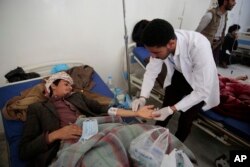The World Health Organization (WHO) reports the cholera outbreak in Yemen has spread to practically every part of the war-torn country. Suspected cases of cholera and acute watery diarrhea now top 170,000, with 1,170 deaths.
WHO reports cholera has spread to 20 of Yemen’s 22 governorates in just two months. Spokesman Tarik Jasarevic says aid agencies are scaling up their operation and refining their response.
He says it is not possible to cover the country at all times, so WHO and the United Nations Childrens Fund (UNICEF) workers are going to so-called hotspots - the most affected areas - to treat cholera victims who are most at risk.
He calls the situation a very challenging one.
“If you look at the numbers, we are talking close to 2,000 suspected cases a day. Cholera is endemic in Yemen. It is currently the largest cholera outbreak that we have in the world,” Jasarevic said.
Cholera can be easily treated by replacing lost fluids right away. But patients can die within hours if the disease is left untreated. Jasarevic says cholera is being transmitted through contaminated water so it is critical to provide people with a clean water supply.
“It is difficult in a situation where a country has a health system that is collapsing. There is simply no money in the budget and health facilities are not having money to run their daily operations. There is also the issue of waste collection that obviously affects the quality of water and access to clean water,” he said.
Jasarevic says the WHO and UNICEF are providing water purification tablets and are chlorinating water in an effort to keep contaminated water sources at a minimum. He says both agencies also are providing money to health workers as an incentive to have them treat cholera patients. He notes health workers have not received a salary in six months.





